
Bhagwan Das Yadav, a security guard in a housing society in Pune, has his smartphone to thank for helping him get through graveyard shifts. Videos are a staple and, more specifically, political ones. And, he doesn’t shy from talking about it. For instance, he greets people with small talk often combined with daily political updates:
“Aaj Modiji Chattarpur mein hein.”
“Kal pata chalega chief minister kaun banega.”
If Bollywood and cricket are the opium of the Indian masses, with due apologies to Karl Marx, politics comes close behind. The average Indian has always been politically aware, but in recent weeks that interest has ratcheted up as the country heads into the world’s biggest elections this summer.
Yadav’s interest in politics is playing out literally on his palm this time around. He’s on top of political news and developments thanks to a slew of regional content apps on mobile phones. The largest among them, Dailyhunt, is banking on the likes of Yadav to propel growth during the upcoming general elections in India.
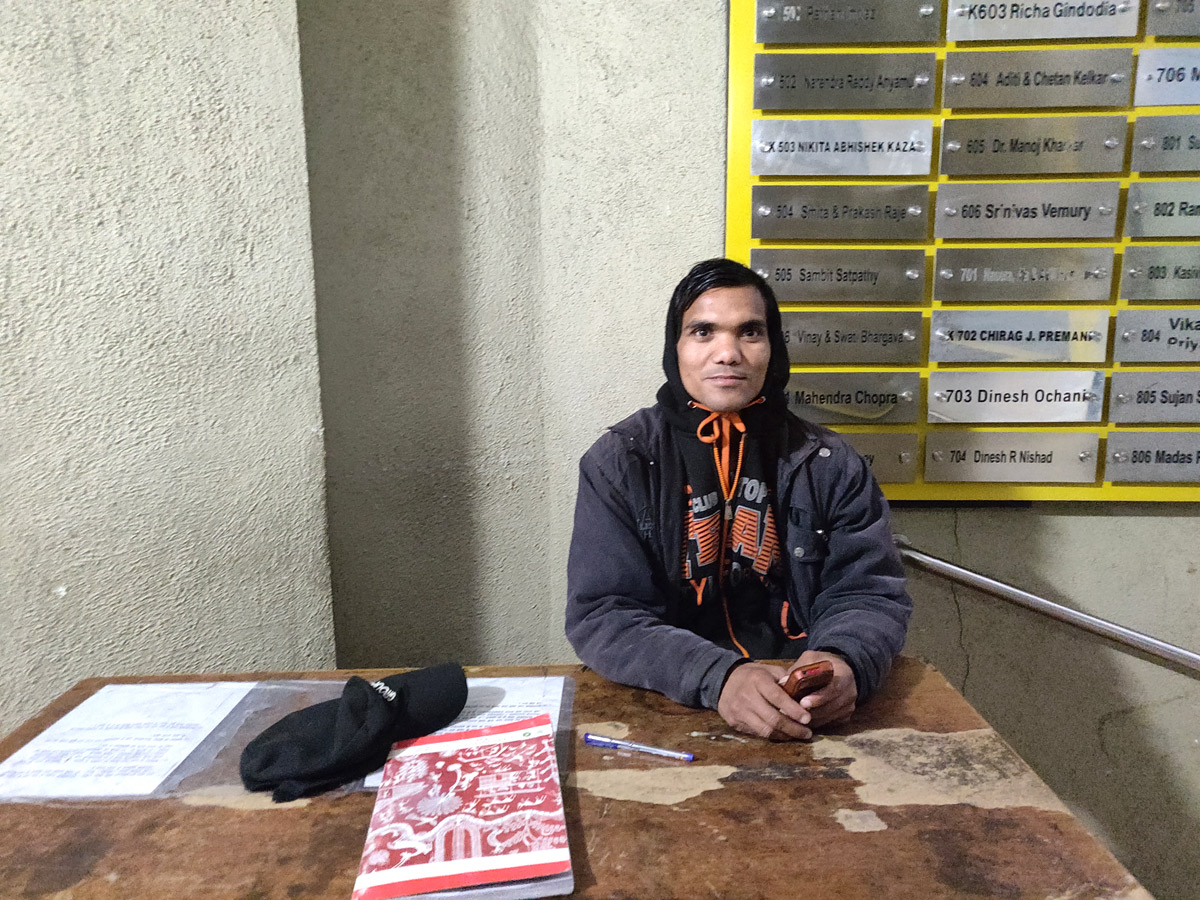
“It is estimated that about 420 million to 430 million people will vote in the coming elections. About 120 million will be first-time voters and over 300 million of them will be second-time voters,” says Umang Bedi, president of Dailyhunt. (Bedi’s estimate of voters, if anything, is on the lower side. India has over 850 million registered voters by latest estimates and if one assumes the voting percentage of 66.38% at the 2014 hustings, the country will have some 565 million people voting this year. Even in the 2014 elections, some 554 million people voted.)
This, says Bedi, opens up a huge opportunity for a platform like Dailyhunt that has 70% of its user base from tier 2, 3, 4 cities and rural areas. In his worldview, platforms like Dailyhunt will play a crucial role in upcoming general elections of India.
In the last couple of years or so, there has been an explosion of regional content platforms in India at the forefront of which is Dailyhunt. Formerly called Newshunt, Dailyhunt, created by ex-Nokia employees Umesh Kulkarni and Chandrashekhar Sohoni in 2009, was the earliest player in the space. Virendra Gupta, the current CEO of Dailyhunt, acquired the company in 2012. Bedi, former head of Facebook in India, joined Dailyhunt in February 2018.
Bedi claims that Dailyhunt now has 140 million monthly active users, the largest for any Indic vernacular platform, making it a natural to double down on political content and updates in the upcoming elections widely expected to be held in April and May. In the coming weeks, Dailyhunt that also owns a stake in OneIndia, an Indian vernacular-focused online news portal, and has partnerships with regional media houses such as Sakal, will be pushing to cover local political news in a big way.
The goal is to ensure that the people across India have the information needed to make an informed electoral decision, says Bedi. “We’re ensuring that the large user base knows about every detail of every party, of their agenda from trusted, reliable sources of content.”
Some advertisers may be swayed. Flipkart, India’s top e-commerce group, for instance, has been advertising on DailyHunt for over two years now has doubled its spend on the platform in the last year. Vijay Sharma, Flipkart’s head of digital media and brand marketing at Flipkart, says, “For advertising, we are looking at platforms that are habit-based, wherein news becomes a key category.”
Within news, Sharma pointed out that the general elections will likely be one among the top three news events this year; the other two being World Cup Cricket and the Indian Premier League. Dailyhunt has been adding a steady user base of tier 2 and 3 consumers – also a target segment for Flipkart – making it an attractive platform to advertise on. Still, he agrees, “it’s still the big boys… YouTube and Facebook running the show” in tier 2 and 3 locations.
For the last seven months, Dailyhunt has been working to put together a 24*7 live election coverage platform that will be streamed on what is being branded Dailyhunt TV.

An extension of the app, Dailyhunt TV, which is already active on the app will have as many channels as Lok Sabha constituencies in India, says Bedi. The company sources content from publishing partners such as Aaj Tak, Amar Ujala, ABP, Hindustan Times, Zee News, Punjab Kesari, BBC Hindi, Jagran, and India TV, to name some. It has built a network of 10,000+ on ground stringers to get live and interactive local news updates from 543 different constituencies in India.
The 10,000-stringer number doesn’t excite top media executive Sandeep Amar. “The kind of manpower and clout required to go on the ground and get a minister to talk to you and give you news bytes cannot be easily pulled off,” says Amar, who is currently building Inaaj, an AI-based content startup. At the consumer end, too, voters largely follow established anchors, he adds.
Still, the Dailyhunt app has features aimed at promoting stickiness. A user can switch between channels and still pick up from where they left. The content will also be personalised to deliver multiple channels, giving the user ability to watch TV, read the news, give feedback, share content, participate in polls and indicate topics of interest to drive further personalization, Bedi says.
To support the task of putting together local news content from over 540 constituencies, Dailyhunt is in the process of creating 10 regional studio hubs and over a hundred collection centres. The company has built a publishing tool that helps stringers, add frames, headlines or text to their content, complete with ingestion formats and processing it before delivering it on Dailyhunt TV.
Durga Raghunath, the former CEO of digital at The Indian Express, says that merely having a large stringer network doesn’t cut it when covering election news. The quality, authenticity and usefulness of content coming from a large group of stringers – who in many cases work as information gatherers adding little value – is often questionable, she insists. What matters is a solid and experienced newsroom working in the backend to make sense of content sent by the network of on-ground stringers.
“It’s so big. Imagine stringers in giant states like Rajasthan, Chattisgarh, Uttar Pradesh and Bihar sending in all sorts of stuff. You have to have a team inside a newsroom first verifying all that and then packaging it. In most cases the stringers keep sending you various information out of which only 10% can be used in a proper newsroom,” adds Raghunath, currently senior vice president of growth at restaurants listings and ordering platform Zomato.
Bedi stresses on learnings from mainstream news brands in Dailyhunt’s internal process. Once the content from the stringers is in, he says, it goes to editorial for a fact-check review, followed by a post video production set up for which the company has hired a large team of video engineers also distributed across the country. The edited videos based on their metadata combined with Dailyhunt’s recommendation engine then determines when to serve this video and to whom.
[Read about Dailyhunt’s recommendation and machine learning efforts in our story here: https://archive.old.factordaily.com/dailyhunt-india-content-king/]
Dailyhunt houses a team of 200 engineers and about 30 video engineers who have been instrumental in putting together the tech stack that will support the election coverage plan, adds Bedi. The team has also hired new video editors to package the political content. The company has over 400 people in content and editorial team via the One India entity, which it acquired in 2016.
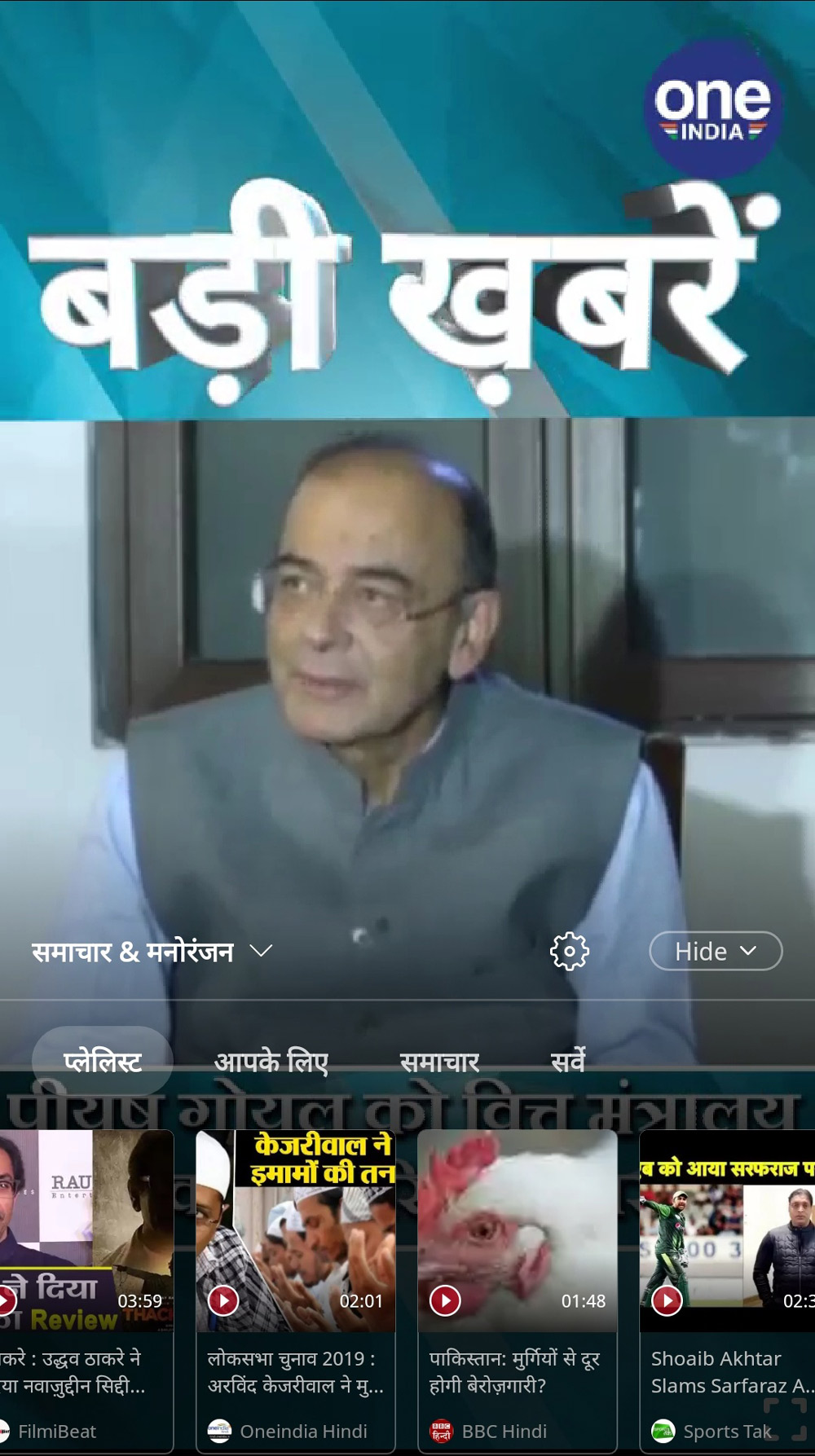
Bedi didn’t want to go into the details of the costs of the election coverage exercise. “We don’t appropriate any cost structure to it, because it’s a part of the core integrity engineering effort itself,” he says, adding that after the elections, Dailyhunt TV will continue to provide other content including entertainment, horoscope, astrology, Bollywood, cricket, and lifestyle.
Dailyhunt, which according to Bedi has 140 million monthly active users, clocks some 12 billion page views and 1 billion video views on its platform every month with users spending an average 27 minutes daily on its platform, according to Bedi. FactorDaily could not independently verify these numbers. By research firm Sensortower’s count, Dailyhunt has 50 million-plus total downloads. Bedi credits the discrepancy to the fact that a lot of apps installs are also pre-burns in Xiaomi, Samsung, Oppo, Vivo, Honor, and Huawei handsets and via APKs from non Google Play stores.
The role of social media platforms during elections isn’t debatable anymore. From the US elections to the BJP’s landslide victory in the 2014 Lok Sabha election in India, social platforms have played a pivotal role.
With global giants like Facebook and WhatsApp exercising extra caution against manipulating the elections of the world’s largest democracy, the field is likely to be left open to smaller players.
Though Dailyhunt lists itself in the news category of apps, content on its platform is more towards the entertainment side. It could be a result of the algorithm that pushes more popular content onto users. But content-wise it makes Dailyhunt a direct competition to some other apps, including Bengaluru-based Sharechat and Chinese tech giant ByteDance’s Indian app Helo.
According to a Sensortower report, Helo reached 60 million installs in December last year, after launching in June 2018. It had 18 million downloads in October alone and was India’s third largest app that month. Sharechat has 40 million monthly active users, according to a statement sent by the company.
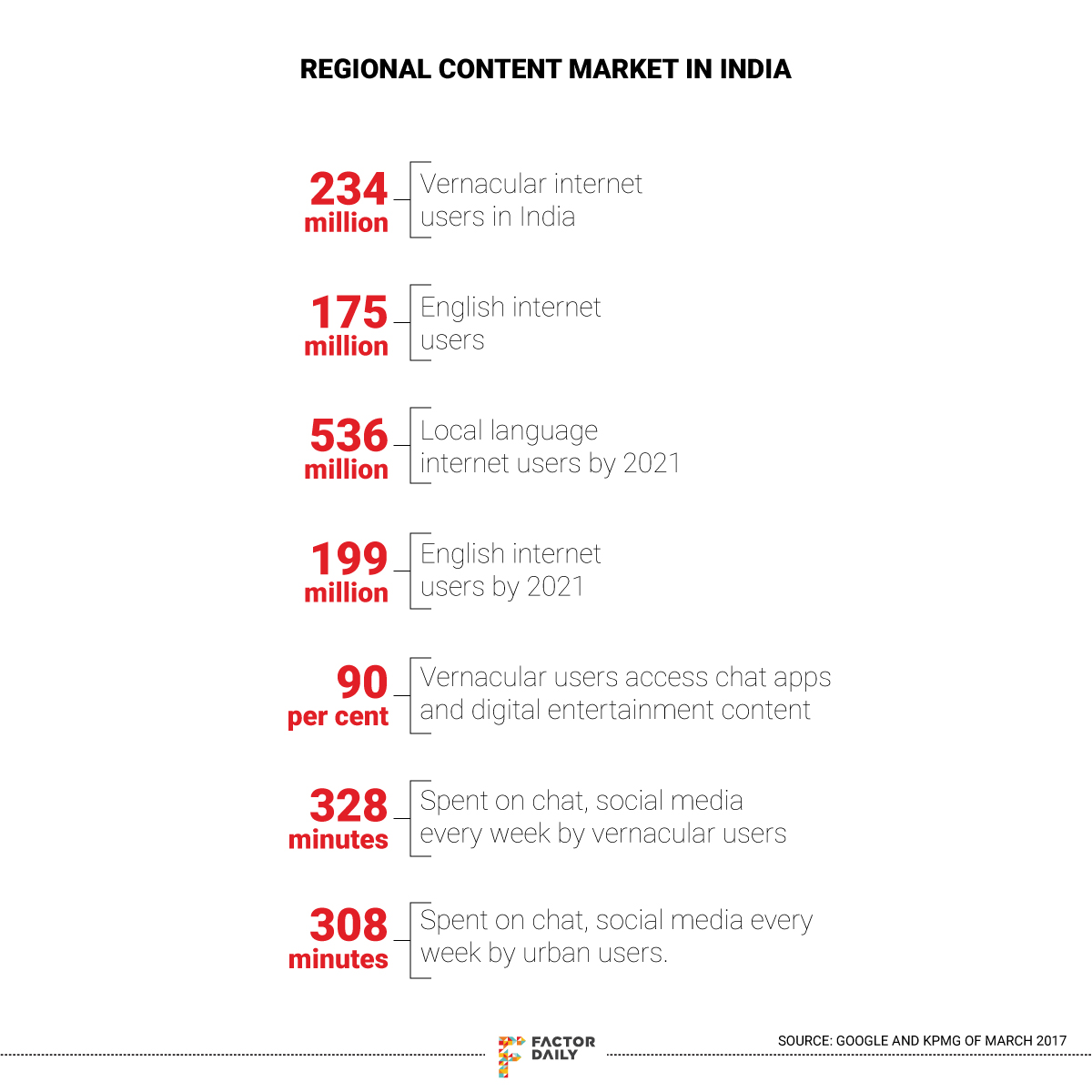
A major difference between Dailyhunt and its rivals – including Sharechat, Helo, SHAREit and Clip – that target the same users is that Dailyhunt focused on partner-generated content as opposed to the platforms that generate data from its users. Dailyhunt hence enjoys higher credibility of the content on its platform, that likely comes from a trusted source or an established news partner. Platforms like Helo, Sharechat and Clip, on the other hand, have often been criticised for carrying fake news, hate speech and racy content.
There has been a push from these platforms to change that perception, of late. For instance, in the last few months, Helo has been focusing on increasing the credibility by encouraging journalists and regional publications to get on board.
Helo, which is owned by Chinese giant ByteDance, is the company’s latest entrant in the India market. In 2016, ByteDance (which was crowned as the world’s most valuable startup in October last year) led a funding round of $25 million for Dailyhunt. In many ways that marked the entry of ByteDance in the India market, where it currently enjoys a huge user base through its products Helo, TikTok and Vigo Video.
“As part of our quest to become a leading source of news and trending topics, we are actively onboarding journalists and media houses, as well as creators and celebrities,” a Helo spokesperson told FactorDaily.
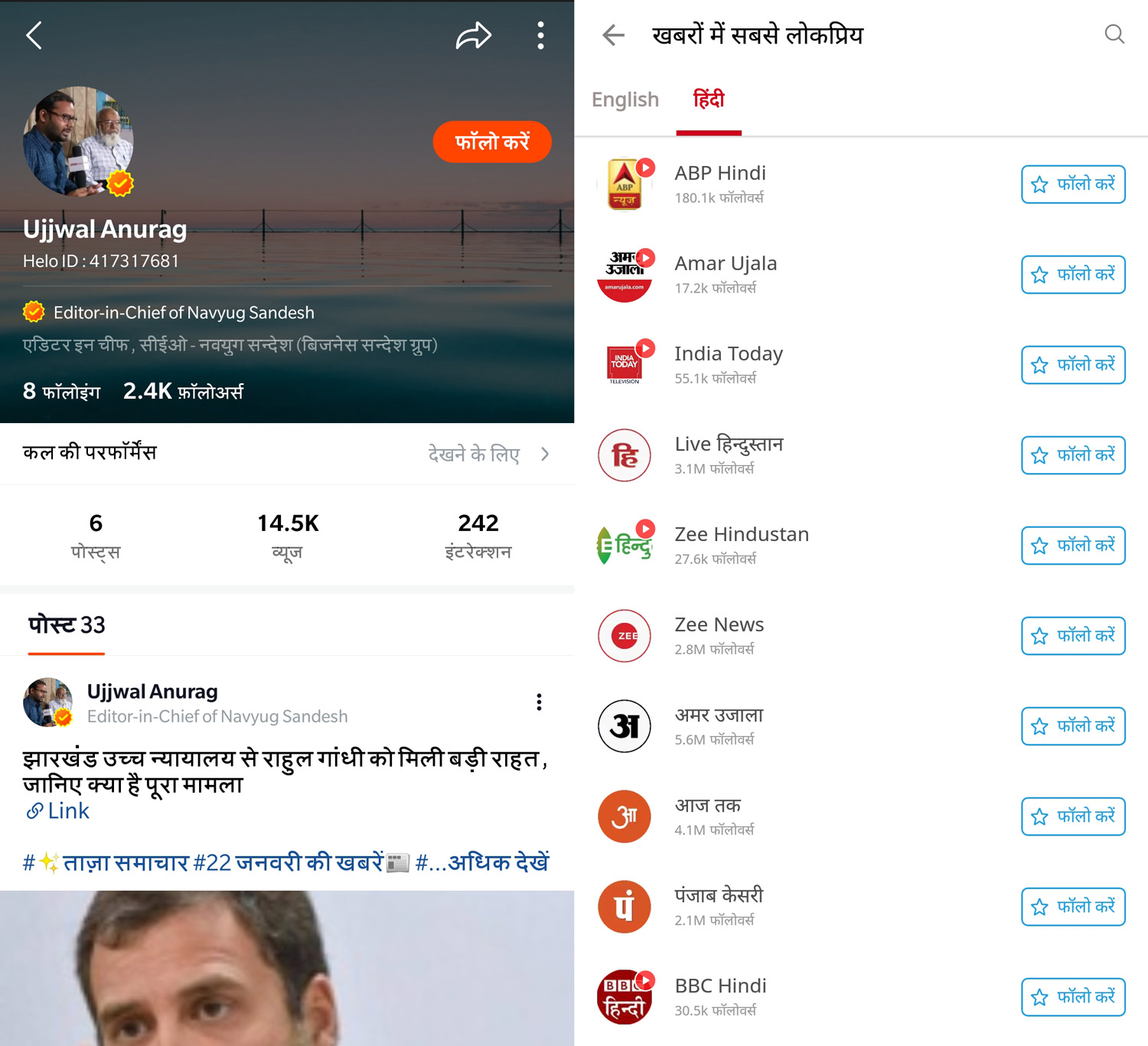
Homegrown Sharechat that has been a haven for political content for a long time now has verified profiles of over two dozen politicians on its platform. Some of them include Maharashtra chief minister Devendra Fadnavis, former chief minister of Madhya Pradesh and senior BJP leader Shivraj Singh Chouhan, information and broadcasting minister Rajyavardhan Singh Rathore, and Satya Pal Singh, minister of state for human resources development.
When it comes to election coverage, most viewers tend to settle for their prefered trusted medium – TV channels, digital news brands, or popular regional newspapers. But let’s not forget, says Raghunath, this is the first national election in a post-Jio-India. (She is referring to the data revolution that has swept India after Reliance Jio, part of Reliance Industries, India’s largest company, launched 4G mobile phone services in September 2016.)
“There are new internet mobile users who have been onboarded through the entertainment route. They are not a part of the Google search world, they are a part of the push world,” Raghunath adds. If Dailyhunt manages to activate that market, which would essentially involve integrating smartly with customers of Jio or users of YouTube (highly popular on Jio), then it stands the chance of getting those new users through election or political coverage, she says.
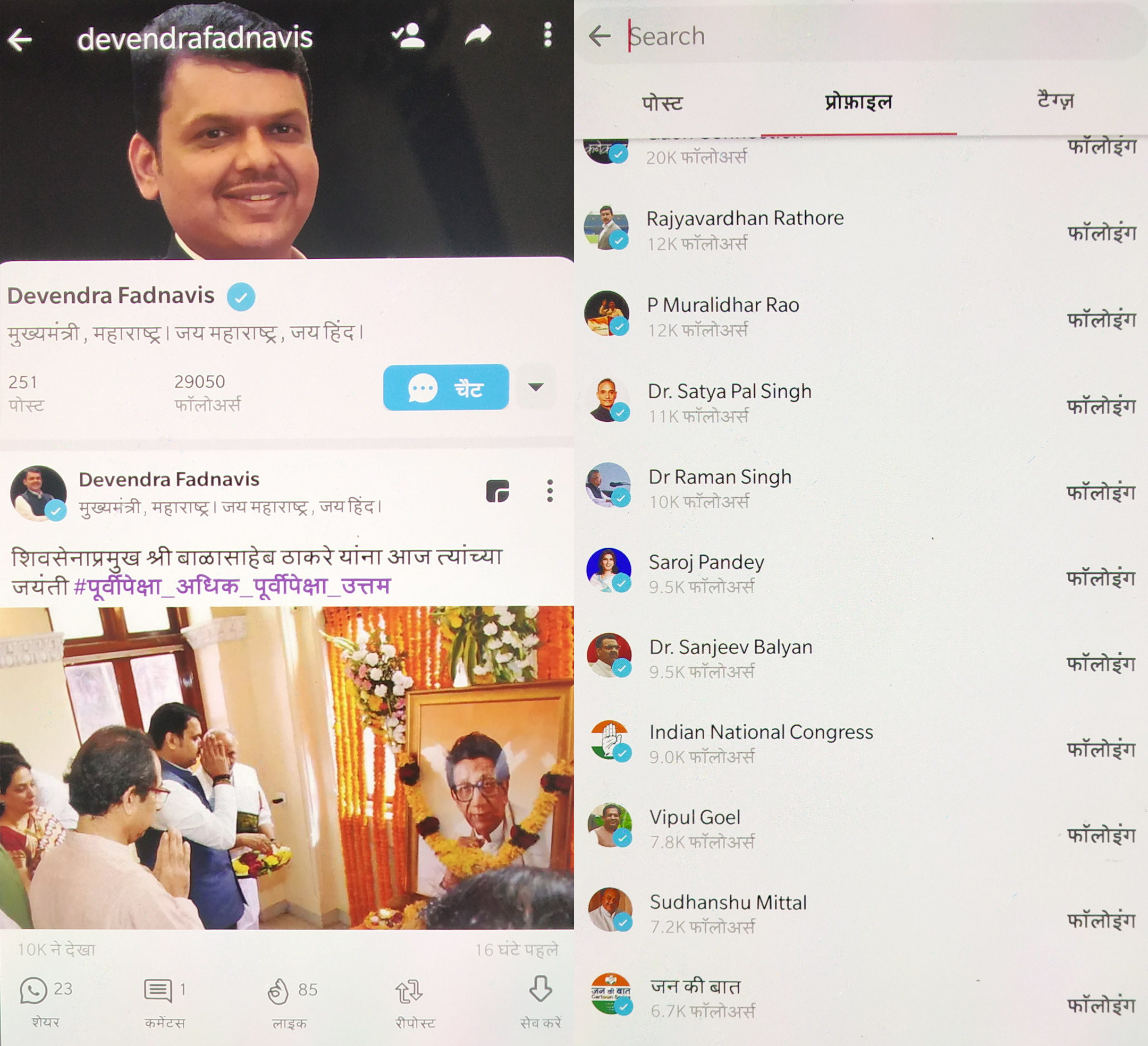
What Dailyhunt is trying to do by rebuilding its reputation as a trusted contender for the source of serious political news is a tricky place for a platform that acquired many of its users by promoting entertainment content. Even today, a post about an actress sporting a bridal look goes viral as opposed to another post on the President’s address for Republic Day that gets fewer than half the views and shares in the same time frame.
When you look at political content in India, there are two kinds, points out Sajith Pai, director at venture capital firm Blume Ventures. “One is serious news where a stringer reports from the ground that so and so happened. That’s not very interesting for users of platforms like Dailyhunt,” says Pai. The second kind of content, which is more focused around content marketing – for example, BJP said so-and-so about Rahul Gandhi or a Modi song that does the rounds on TikTok – is what’s getting more traction these days. Platforms like ShareChat, TikTok, and even Dailyhunt, to some extent, have become vehicles for such content, says Pai.
He adds that if Dailyhunt is getting into the more serious news content business, there is enough fragmentation there with newspapers and TV channels. But if it is looking to create and promote more content marketing – “for example, if Dailyhunt can become the meme distributor for political content, then that would be a brilliant market for them,” Pai says.
The election dates are yet to be announced but the biggest of Indian digital platforms has announced its plans to monetise its coverage of the hustings. You can be certain it will not be the last.